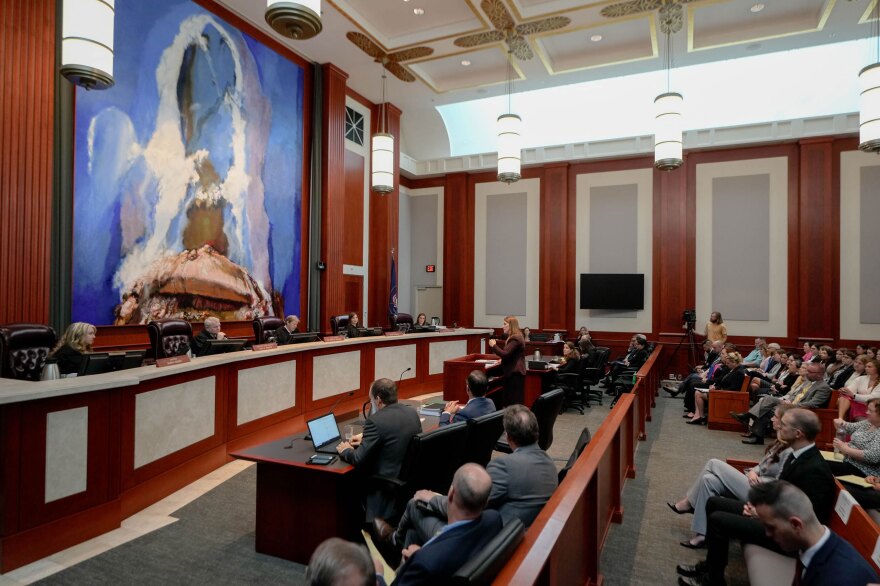After almost a year of deliberation, an injunction blocking Utah’s near-total abortion ban will remain in place after a ruling by the Utah Supreme Court.
In a 4-1 decision, the justices determined that The Planned Parenthood Association of Utah has standing to challenge the state’s so-called “trigger law,” which bans virtually all abortion in the state with few exceptions. Associate Chief Justice John A. Pearce wrote for the majority that a lower court did not abuse its discretion when granting the injunction in 2022.
However, the court did “not decide the merits of PPAU’s claims that SB 174 infringes on rights the Utah Constitution protects.”
This means the injunction stays in place while the underlying case is determined in the lower court. Abortion is still legal in Utah up to 18 weeks of pregnancy.
“Today’s decision means that our patients can continue to come to us, their trusted health care providers, to access abortion and other essential reproductive services right here in Utah,” said Kathryn Boyd, president and CEO of Utah Planned Parenthood. “While we celebrate this win, we know the fight is not over.”
Utah House Democrats applauded the decision, stating it “ensures that essential health care services remain accessible.”
“Across the country, we have seen the devastating impact of aggressive abortion bans on women. Today, Utah avoids joining those statistics,” the statement read.

State Sen. Dan McCay, the author and sponsor of the state’s near-total ban, was quick to call for further legislative action in response to the court’s decision
“I've notified the governor and I've notified legislative leadership today that I'm going to be asking for a special session between now and the end of the year to look at our own abortion law,” he said.
McCay added that the special session would include potentially further restricting the state’s 18-week abortion ban to six weeks.
“Iowa, South Carolina, Georgia, and Florida all have six-week bans. There's no reason why those being constitutional ready, that we couldn't make [a] similar change.”
While his Republican colleagues have been “very supportive of pro-life measures,” he said he has not spoken further with his colleagues about changing the timeframe of when abortion is legal. He’s confident, however, that they can reach a short-term solution while the court process continues to play out.
The legal squabble follows the U.S. Supreme Court’s 2022 Dobbs v. Jackson decision that overturned Roe v. Wade. The question of abortion regulation was put in the hands of states and a patchwork of laws developed. Utah’s trigger law was passed by the Legislature in 2020 to be ready for such a time when the protections of Roe fell. Other states passed similar laws to fully ban abortion if the tide shifted in court.
Loading...
The Planned Parenthood Association of Utah sued and a district judge enjoined the law in June 2022. With the injunction, a previously passed 18-week limit for abortions became law with the ban tied up in court.
The state appealed to the highest court on whether the injunction should remain. The five justices heard oral arguments on the case in August of last year.
Even with the ban tied up in court, the Legislature continued to make moves limiting the procedure. Abortion clinics were banned in 2023, but that law was also enjoined. Lawmakers responded by repealing portions of the law earlier this year. Bill sponsors argued it would simplify the case in front of the high court and expedite a ruling on the trigger law. The court, however, has kept its own timing. It’s been 454 days since oral arguments and 140 days since the governor signed the bill modifying the clinic ban.
Majority Whip Karianne Lisonbee, the sponsor of the trigger law, the clinic ban and its later modification, called it “deeply unfortunate that Utah’s strong pro-life law” is still held up by the courts two years after Dobbs.
“I am extremely disappointed that the Supreme Court failed to lift the preliminary injunction and has not allowed Utah’s abortion law to go into effect,” her statement said. “Utahns deeply value human life in all stages and all circumstances. As legislators, we are committed to upholding those values in our laws.”







